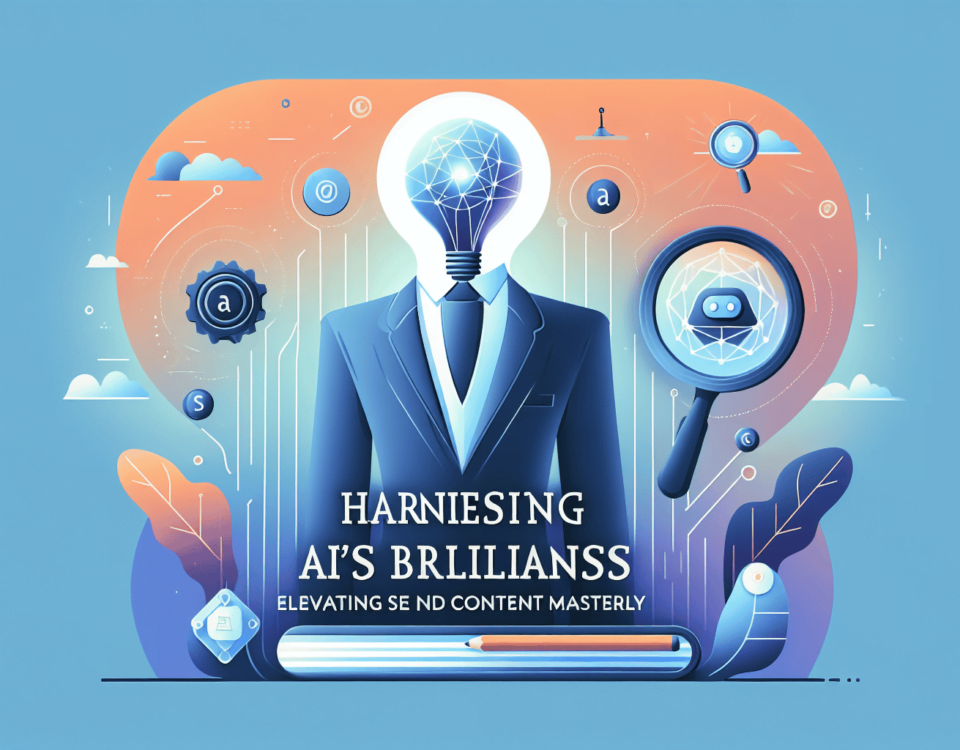The Dawn of Ultra-Personalization with AI
Personalization in marketing has evolved from a buzzword into an essential strategy, and AI is the key to unlocking its utmost potential. As 2024 dawns, we find ourselves at a peak of customer-focused marketing where AI-driven personalization is not just preferred, but expected by consumers. The crux of this revolutionary shift lies in how AI meticulously analyses consumer data to deliver individualized experiences at scale. It understands consumers on an almost personal level, reflecting their preferences and behaviors across multiple touchpoints, thus painting a picture with a level of detail previously unattainable.
- With AI, dynamic content creation is no longer a mere convenience but a requisite for maintaining consumer engagement.
- Through machine learning algorithms, brands can predict future purchases, suggest relevant products, and even tailor the site experience in real-time.
The amalgamation of AI with omni-channel strategies means that a consumer’s interaction with a brand is seamlessly personalized, whether they’re browsing a website, chatting with a virtual assistant, or receiving targeted advertisements. Digital leaders predict that brands adopting ultra-personalization will see a revenue uplift of up to 15%, suggesting a robust link between personalization and profitability.
Yet, this is just the beginning. As we move deeper into 2024, AI will continue to refine personalization, transforming not just how we market, but fundamentally altering the expectations of consumer-brand relationships.
Virtual Reality and Augmented Reality: The New Marketing Frontiers
Advancements in technology have paved the way for an era where VR and AR are not just innovative gimmicks but essential components of a brand’s marketing repertoire. Empowered by AI, these tools simulate experiences that go beyond the flat confines of screens, enveloping consumers in brand stories and products like never before. Imagine trying on a watch from the comfort of your home or visualizing your living room with a new sofa before making a purchase—these once futuristic fantasies are today’s reality.
Virtual reality enables consumers to immerse themselves entirely in a simulated brand universe, which can drastically elevate the emotional impact of marketing campaigns. Meanwhile, augmented reality blurs the lines between the digital and physical worlds, allowing consumers to enhance their immediate surroundings with virtual elements. In fact, a study suggests over 70% of consumers expect brands to offer AR experiences, indicating the growing demand for immersive technology in marketing.
Brands can craft captivating virtual narratives, drawing customers into a meticulously designed world that conveys the essence of their product. As AI continues to refine these technologies, we can anticipate a sharp increase in brands leveraging VR and AR not merely for novelty but as central pillars of customer experience strategies.
This integration of AI with VR and AR is not just about novelty; it’s a resounding testament to the potential of immersive experiences in enhancing consumer engagement and the tangibility of virtual interaction with products, which until recently, was unthinkable.
Ethical AI Marketing: Building Transparency and Trust
The utilization of AI in marketing ushers in not only innovative opportunities but also a strong emphasis on the duty of ethical applications. Our obligation towards ethical AI marketing encompasses both transparency in how consumer data is used and an assurance against bias in AI algorithms. Clear communication with consumers about how their data informs personalization efforts is no longer optional—it’s a baseline expectation.
Every touchpoint, from targeted advertisements to customer service interactions, demands a commitment to transparency, privacy, and security. There’s a clarion call for marketers to establish robust of ethics guiding the deployment of AI. For instance, more than 80% of consumers say they’re more likely to trust a company with their data if they are transparent about how it’s used, which underpins the clear correlation between trust and transparency.
Moreover, as AI defines increasingly significant segments of our marketing strategies, biases—whether unintentional or systemic—must be meticulously audited and mitigated. Actions like regular checks on algorithmic decision-making, training programs for inclusive data handling, and diversification of teams crafting AI systems are critical to circumvent biases and cultivate an equitable marketing landscape.
Thus, ethically aligned AI provides a cornerstone upon which consumer trust can be built and sustained, ultimately fostering long-term brand loyalty in a marketing ecosystem powered by integrity and responsibility.
Content Creation Reimagined by AI
As narrative remains central to brand identity, the rise of AI-enabled content creation tools has redefined how stories are crafted and disseminated. Gone are the days when content generation was purely human labor—AI’s capabilities now extend to crafting authentic and dynamic communication with ease and agility.
The influence of AI on content creation is multifaceted; not only can it generate text, but it’s also capable of creating sophisticated visuals and videos resonant with your brand’s voice and ethos. For instance, Gartner predicts that by 2025, AI-driven content will represent 30% of all digital content. Moreover, it can adapt and learn from audience reactions, ensuring that your content strategy remains agile and responsive.
From automated blog posts to AI-curated social media feeds, the realm of content marketing is experiencing an unprecedented expansion, limited only by creativity. Furthermore, AI’s ability to optimize for SEO practically in real-time caters to the rapidly changing algorithms of search engines, ensuring content that not only captivates but also converts.
Enabling content scalability without compromising on quality, AI is transforming the very notion of brand storytelling, melding human creativity with machine efficiency to produce content that is engaging, relevant, and undeniably effective.
Navigating Through the Tide of AI Legislation
As we progress further into 2024, the legislative landscape concerning AI is evolving pari passu with technological advancements. Navigating this tide is not without its challenges. AI legislation is no mere legal hurdle but a set of guidelines ensuring that the capabilities and applications of AI align with societal norms and values.
For marketers, this means staying abreast of the latest regulations and ethical standards is paramount. A McKinsey report underscores that businesses who are proactive about understanding and aligning with AI policies can gain a distinctive edge in their industry. Compliance is not merely a box-check exercise; it embodies a commitment to responsible innovation.
The implication of AI in data handling and privacy entails consistent attentiveness to existing and emerging legislation, from GDPR to the California Consumer Privacy Act. Brands must integrate a proactive and predictive approach to policy adherence into their marketing strategies, preparing not only for current mandates but for future regulatory landscapes as well.
Ultimately, legislative fluency in the realm of AI becomes a strategic advantage, facilitating ethical applications and fostering trust between consumers and brands in a market where ethical stewardship is just as valuable as innovation.
Cutting-Edge AI Marketing Trends on the Horizon
The confluence of AI and marketing has set the stage for ground-breaking trends that will further revolutionize the marketing industry. Artificial intelligence’s deep learning algorithms are prophesied to become increasingly adept at gauging consumer sentiment, providing businesses with near-clairvoyant predictive capabilities regarding market fluctuations and consumer needs.
For example:
- Predictive Consumer Behavior Analysis allows companies to stay a move ahead by analyzing current data to forecast future trends.
- AI-Driven SEO that constantly evolves, enabling brands to rank higher on search engines and attract greater organic traffic.
- Voice and Conversational AI, as speech recognition technology perfects, herald a dawn for voice search optimization and interactive customer interfaces.
The integration of these AI-driven strategies is not only about efficiency; it introduces an era of marketing that’s not only responsive but also anticipatory, crafting experiences that anticipate a consumer’s needs and curiosities before they’ve fully formed.
Statistically speaking, the harnessing of AI in such capacities could indeed translate to significant competitive advantages. Brands embracing these trends are slated not just to survive but to thrive in an ecosystem that’s irrevocably altered by the onset of an AI-empowered marketing renaissance.
Preparing for the AI Transformation in Marketing
As the landscape of marketing morphs, embracing AI transformation is an imperative, not a mere option. Brands that maneuver to integrate AI into their strategies now are positioning themselves for success in a future that’s not only digital but also intelligent. Acknowledging that the dynamics of consumer engagement, content creation, and marketplace competition are now governed by AI is foundational to any forward-thinking marketing strategy.
Preparing for this tectonic shift means investing in AI-ready infrastructure, training teams to understand and work alongside AI tools and embracing a culture of lifelong learning. Companies must recognize that AI is not a separate tool but a deeply integrated partner that enhances every aspect of the marketing mix.
While the frontiers of marketing expand, brands that adeptly marry AI innovation with human creativity will stand out. A blend of ethical practices, legislative compliance, and unwavering commitment to consumer satisfaction will pave the path for these visionary brands. Embracing these trends today will not merely secure a competitive advantage; it will define the next horizon of exceptional marketing.
Therefore, let the preparation be an ongoing journey, not a destination. Marketing professionals who look toward AI with a strategic eye will find not only a tool for optimization but a catalyst for reimagining the very essence of connection between consumer and brand.




